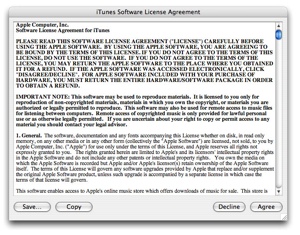
|
|||||||||||||||||||||||||||||||||||||||||||||
|
Wednesday 28 September 2005
Media
21st-Century Capitalism at the Washington Post Harold Myerson has a column on today’s Washington Post op-ed page headlined ‘Outsourcing Our Safety’. It’s based around the recent emergency landing of a JetBlue A-320 at LAX. Shortly after takeoff, it appears that the plane’s front landing gear got turned to, and locked in, a 90-degree position. With the wheels like this, the landing gear could not be retracted, nor could the plane land normally. As it happens, the plane was able to land safely in Los Angeles, as can be seen in this nifty photo from the New York Times:
Myerson uses the incident as jumping-off point to complain about corporate outsourcing and governance. He writes:
Myerson strongly implies that outsourced maintenance is a bad thing in and of itself — and, a little less strongly, that TACA’s Salvadoran mechanics are inferior to American, FAA-licensed mechanics. If this were true, we would expect two things to be true: first, TACA itself would be an accident-prone airline, and accidents would be increasing as more and more airlines outsourced their maintenance. From AirDisaster.Com, we learn that air travel is getting safer, not the other way around:
So not only have accident rates dropped steadily over the last ten years (the last time there was year-on-year increase in that rate was 1992, and the last time there was any kind of increasing trend was 1978 and 1979), but the absolute number of accidents is falling despite increases in the number of flights. And as for TACA, well, the last incident of any kind listed by AirDisaster.Com is in 1993; the last fatal accident was in 1959. So much for outsourced maintenance causing safety problems. But that doesn’t stop Myerson:
Damn that 21st-century capitalism, what with its avoidable risk! Killing all those people! If only we had a system more closely attuned to social justice, our accident rate wouldn’t be increasing! Wait a minute, our accident rate isn’t increasing; quite the opposite. Could it be that this terrible ‘capitalism’ actually results in increased safety? Possibly, but you’re not likely to read about it in the Washington Post. Air France, a state-owned carrier that certainly does not outsource its maintenance, has a fatal-accident rate of 1.19 per million flights, or a third higher than the entire world; Cubana, which is owned by the Cuban state and therefore certainly not tainted by that awful capitalism, has a rate of twenty-four fatal accidents per million flights, or over 2666% higher than the whole world. Myerson isn’t done telling us of the dangers of capitalism, though, or of embarrassing himself:
It’s idiotic to even discuss the specific companies whose names he invokes: in particular, Wal-Mart stands out in American business not only for being wildly successful, but for keeping most of its functions in-house. It owns its own distribution system, for instance, which today is true of very few companies. Myerson seems to be unwilling to understand that ‘squeezing costs’ is innovation. If you invent a machine that allows you to do twice as much work as you used to, is that ‘innovation’? Certainly. If you use that improved productivity to sell your product for less, is that ‘cost-squeezing’? Yes. ‘Cost squeezing’ without innovation means turning out an inferior product. Some companies do indeed try this, but fortunately (because of that terrible free market) those companies will tend to go out of business before long.
All of Myerson’s fallacies come together in this paragraph, and in the sentence in the last one about ‘the number of employees who benefit from the core corporation’s increased revenue [being] greatly reduced’. The CEO is supposed to be the shareholder’s man in the company. That’s his whole freaking job. The board — which is to say, in theory at least, the shareholders — hire the guy to run the company on a day-to-day basis. And in fact the problem is usually either that the CEO runs the company for his own personal benefit (buying gold-plated bathtub fixtures as business expenses, for instance), or that he is captured by the corporate bureaucracy and that he in fact does run the company for the bureaucracy’s benefit and not for the that of the shareholders. Is it really possible that a lot of the Post’s opinion pieces on business and economics are based on this kind of understanding? Maybe the Post isn’t so much a liberal paper, then, as it is a profoundly ignorant one. Posted by tino at 14:49 28.09.05
Monday 26 September 2005
Customer Service
Earthlink Wireless So I have a Treo 650, which is the worst cell phone in the world except for all the other ones. It reboots several times a day; the Bluetooth capabilities of the thing are minimal to broken; the mail client that comes with it sucks, hard; and sometimes people will call me and get sent straight to voice mail, even when I am available and have a good signal. When it’s working as intended, it’s Today the thing finally gave up the ghost all together. It won’t do anything at all when running off the battery, and when plugged in it’s totally unresponsive, saying that it’s trying to connect to Earthlink Wireless, and never succeeding. So I called Earthlink support, and got through to a human after about a minute (if that) on hold. The guy spoke English, and I assume he was in the United States. I’m not entirely sure, though, because he asked me three times if ‘VA’ was the correct abbreviation for Virginia. I don’t really care where phone-support people are, but the use of inexpensive Indians for this kind of work can lead to strange things like having to explain that Washington, DC is in the eastern time zone, or that ‘VA’ is the abbreviation for Virginia. No matter where the guy is, the computer should figure out town, state, and abbreviation from the zip code, but that’s another matter. Anyway, so I explain to the guy what’s wrong, but he’s not really interested in listening: at one point he actually interrupted me to finish my sentence. He concludes that they should replace my phone, but because he didn’t actually listen to me explaining what was wrong with it, they’re not going to gain any insight into future problems. Maybe that doesn’t pay off for them anyway, though. So he takes my name and address (they already have this information, of course, but it’s cheaper to make me read it off again than to link their billing database and their customer-service database) and tells me that I should get a new phone within seven to ten business days. I asked him whether they got a lot of complaints about the seven-to-ten-days business, and he launched into what sounded like a prepared speech: which would suggest that the answer to my question was yes. He eventually got around to telling me that ‘it was a matter of preference’, i.e. that if I preferred better service, I could always go try to find another cell phone company that might provide it. I asked whether they’d like to terminate my contract right now, and have me send the phone back to them, with no early-termination charges to me. Computer says no, of course: so as it turns out, it’s not actually a matter of preference, unless I would prefer to pay them hundreds of dollars to get out of my contract. In the end, he did credit me for a month’s free voice service (but not a month’s free data service; but then I’m unlikely to be out of commission for a month), and Earthlink Wireless is very cheap, so I suppose I am satisfied. Further, it is likely that Earthlink is underpromising and hoping to overdeliver. It’s far better to tell a customer seven days and deliver in five, than to tell him two and deliver in three. What I can’t figure out, though, is why they can’t do this more quickly. When a customer calls because his phone isn’t working, he’s already likely to be a bit unhappy with his service. If you have your act together just a little bit, you can turn this around by Exceeding Expectations. To a certain extent, these days, you can Exceed Expectations just by answering the phone. But if you maintained a pile of phones, all already packaged for shipping, with barcode labels with the serial numbers on the outside, the entire shipping process could be reduced to:
In this scenario, the customer would have a new phone in less than 24 hours, or, if you want to save money on shipping, in less than 48 or 72 hours. UPS or FedEx can give you a quite specific predicted delivery time, partly because, in the event that they are on track to deliver the package earlier than they are contractually obligated to, they’ll sit on the thing rather than surprise anyone with unexpectedly good service. This is called ‘capturing the consumer surplus’, though if you work too hard at it you will find that one of your competitors is better at actually capturing the consumers and their money. But as it happens, Earthlink doesn’t keep these things in stock, or, if they do, they do it in a way that means that it not infrequently takes them a week to send them out. If I pay for the fancy shipping, I can order something from Amazon right now and have it here by ten in the morning tomorrow. How much longer do companies like Earthlink expect to be able to tell people ‘seven to ten days’ and not lose customers? I expect to have an update later in the week (or possibly in seven to ten business days) when I get the phone. At that point we’ll also see whether my draft rant on Why The Treo 650 Sucks is still germane. Posted by tino at 15:06 26.09.05
Monday 19 September 2005
Random Interesting Thing
First It Started To Fall Over, Then It Fell Over Wait — did you say implosion? A little movie of this afternoon’s implosion of the Avex Fibers boiler house in Front Royal:
If you don’t like embedded movies, you can download it here. It’s a little over 2 MB. Posted by tino at 16:07 19.09.05
Thursday 15 September 2005
General Idiocy
Washington Post: Feds Meant To Kill People In New Orleans The Washington Post today says that the intention of the federal government was to kill people and to cause suffering of innocents in New Orleans. Or so they seem to say, anyway. Howard Kurtz, the Post media critic, is usually fairly good, but today he’s gone so far off the rails that I have to question his sanity. He compares the actions of the federal government in responding to the flooding of New Orleans to the government’s 1993 attack on the Branch Davidians in Waco:
Yeah, well, in that case, Howard, elected officials and other Constitutional officers of the United States positively gave orders that, whatever their intent, resulted in the deaths of 85 people and the utter destruction of a lot of private property, on the theory that the people on that private property might be breaking some laws. On the other hand, this month the federal government actually exceeded its own guidelines in responding to Hurricane Katrina: the official word is that individuals, municipalities, and states should be prepared to tough it out on their own for five to seven days before the feds show up. Federal relief started showing up four days after the hurricane hit, and three days after the city flooded. You see the similarity? That’s good, because I don’t. Because many of the witnesses to, and much of the evidence of, whatever crimes may have been committed by the Branch Davidians at Waco were and was killed and lost in the attack, it’s hard to know precisely what was going on there. At best, the government acted in the best of intentions and with proper evidence and totally within the law, and wound up killing eighty-five people, many of whom might safely be presumed to have been innocent of any crime. So unless you buy the conspiracy theories that the federal government deliberately blew up the levees for the express purpose of flooding the city — particularly the black parts of the city, because they’re racists, remember — this comparison is mind-bogglingly inapt. Eight paragraphs later, Kurtz grudgingly admits:
What? What the fuck? What underlying principle? Is the Washington Post suggesting that the federal government deliberately set out to kill people in New Orleans? Because I can’t really see any other ‘principle’ behind firing incendiary grenades and .50-caliber machine guns into the Branch Davidian compound. To suggest that the incidents at Waco — which are probably most charitably characterized as a police riot at the highest levels — and the federal response to Hurricane Katrina are in any way similar is utterly not just insane but insulting. And while I am not particularly surprised to see this coming from the Post any more, I am a bit surprised to see it under Howard Kurtz’s byline. Posted by tino at 10:48 15.09.05
Tuesday 13 September 2005
Random Interesting Thing
Yo Ho Ho This is possibly the Worst Thing Ever. Now available at Big Lots for only $39.99: It’s the Haunted Galleon lighted & animated cheap plastic thing. The little ship rocks back and forth on its plastic waves, to the soothing sound of grinding and gnashing plastic gears. Little red LEDs in the cannons blink on and off; presumably this represents the cannon firing. If so, it represents it very poorly. And as if that weren’t enough, out of the middle of this thing comes a scratchy, distorted, greeting-card-quality recording of the little plastic sailors singing
After this, the ship plays a jaunty little tune that I’m not familiar with. And then the Fifteen men business starts up again, and this cycle continues forever. Consider this thing for a moment, shown here to maximum advantage in its official product shot:
Someone, somewhere (probably at the research and development campus of Lemax, which appears to be the responsible party here) decided that what was needed was a ‘spooky’ animated singing lighted haunted galleon for people to put on display for Halloween. From their website:
So they designed this thing, got the Lemax Glee Club to record their version of ‘Fifteen Men’, and shipped the designs and recordings off to China. In China, someone made molds for the shapes, procured the paint, little pirate flags, LEDs, geartrains for the animation, etc., etc., and hired people to put it all together. Then, after they had a few thousand of these little ships in boxes, the boxes were packed into a shipping container and sent all over the world (but mainly, I assume, to North America) to be sold. It’s truly amazing. There are people out there — hundreds or even thousands of people — who make their entire living from the ‘lighted village pastime’. And at least a few have made a living out of this terrible nasty little plastic ship. This cell-phone movie I took does not do it justice because the phone tends to pick up more sound from behind the camera than from the thing that’s actually pictured. Posted by tino at 16:40 13.09.05
Thursday 08 September 2005
Hysteria Watch
Incandescent Lunacy Lileks writes about the conspiracy theories and such surrounding the response to Hurricane Katrina:
Posted by tino at 10:48 8.09.05
Customer Service
Someone Else’s Customer Service Rules Rob Griffiths has a customer-service-rules-esque post up. I have to question his giving Cingular customer service ‘7 out of 10’ even after having to call back three times (twice to deal with Cingular’s bureaucratic requirements, once because he was cut off — strange how common that seems to be when talking to ‘customer service’ types, and how rare otherwise, answer the same questions for the machine and for humans, etc., etc. In the end, it appears that they actually agreed that he had a problem, and they are attempting to fix it: this might account for his warm fuzzy feelings. But shouldn’t basic competence and fulfillment of contractual obligations be the bare minimum, rather than 7/10? UPDATE: After getting his new phone in the mail, he found that he was in the same state as before: no data service. He called back and had the problem solved quickly, when the rep had him change the prefix on his ‘APN’ and ‘User Name’ entries from ‘WAP’ to ‘ISP’. (Cingular probably uses these prefixes to distinguish high-volume data-service accounts like those associated with the Treo from the lower-volume account used with ordinary phones with rudimentary data capabilities: but why? Why on earth does this need to be distinguished in the user name, where it can potentially cause problems like this?) This knowledgeable rep would seem to have precipitated a Customer Service Victory, but in fact he just averted more of a Customer Service Disaster.
Total cost to Cingular: the difference between the cost of a new Treo and the value of an old one, plus the cost to handle four or five phone calls, plus the loss of customer goodwill (though I must say that Griffiths seems more patient than Tino). And what caused this? A change that Cingular made from one method of seemingly pointless network-authentication hoop-jumping to another. Still, in that the problem was solved in 24 hours seems about as big a win as you can expect from cell phone customer service these days. Certainly it’s different from my recent experience with Cingular, where they overbilled me to the tune of several hundred dollars (they’d signed my account up in the computer for the per-megabyte service plan rather than the flat rate plan specified in the contract) and took a couple months to sort things out. Everyone was quite friendly (except their debt collectors, who were actually pretty nasty about the overcharges I hadn’t paid), and everyone agreed on what had happened and what needed to be done to solve the problem, but I still had to call back seven times and spend hours on the phone to sort out their error. I now have a phone from a different carrier, thank you very much. Posted by tino at 10:18 8.09.05
Wednesday 07 September 2005
Technology
Installing iTunes, Part 2 Adding insult to injury, after you install iTunes (having gone through the ten steps of the installation process, and after having had to click two separate buttons to deal with agreeing to the license), you are again required to agree to the software license. In the grand scheme of things this isn’t a big deal. Hell, it’s not even a big deal in the scheme of things that happened to Tino today. They were out of ketchup at McDonald’s, and they gave me the wrong salad dressing; the paint we chose for the living room looks kind of dingy there, so we need to pick a different color; one of the painters was sick today, so the whole painting thing is going to take longer than anticipated. All of those things are more inconvenient than having to click on eleven separate things to communicate a single intent (i.e. ‘Install iTunes, you!’) to the computer. But then McDonald’s doesn’t base its whole value proposition around being compenent; my painter doesn’t hold himself out as the world’s healthiest man; and Sherwin-Williams is not all about ‘White Hyacinth’ paint looking good in my living room. Apple, on the other hand, is all about computer systems that are not unnecessarily complicated. Or at least that’s still the marketing message. Posted by tino at 18:50 7.09.05
Technology
Installing iTunes A new version of iTunes is out, and I’m trying to install it. However: I’ve got two questions: 1. Why, oh why on Earth do I need to reboot to install a freaking music player? The Macintosh gets more like Windows with each passing day. 2. So we’ll assume that it’s absolutely necessary for me to reboot: fine. I can’t really imagine why this should be, but for the moment we’ll assume that it is. (In this case, it’s because iTunes wants to install the iTunes Phone driver (more about that phone later), which is inexplicably tied into the kernel somehow.) This is idiotic enough on its own, but why do you not inform me of this until after I have:
I do a lot of things with my computer. Here’s what I have open at the moment: I’m not about to reboot and have to get all that stuff set up again — it would take me the better part of an hour just to tidy things up to the point where I could close it all without losing track of what I’m working on. I had a few minutes available, and I thought I’d install the new iTunes: but after going through nine steps, I am informed that installing the thing won’t take a few minutes, but a couple of hours. Apple, the makers of user-friendly computers! I suppose they still have breathing room, though: it’s only recently that the default Windows program installation didn’t involve having a giant window cover your entire screen for the duration of the install process. Posted by tino at 15:47 7.09.05
Tuesday 06 September 2005
Government Mischief
Interesting New Orleans Story Here is a first-person account of the aftermath of the New Orleans flooding that showed up today on the Daily Kos. I’m not sure how true it is; on DK they aren’t even sure of its provenance, so I’m taking it with a grain of salt for now. One of the writers credited has an unusual name, and to judge from Google she is a paramedic and a labor-union rabble-rouser from San Francisco; the other has a name too common for Google to be very helpful. Some of the conclusions drawn are glib, to say the least (Racism!!1; Bush!!!11; Iraq!!!!1; etc.), but the rest of the story is interesting and insightful, and nothing really conflicts with anything I’ve heard elsewhere. After having their buses commandeered and being kicked out of their hotels, the band of hurricane victims of which the writer was a part wandered from Superdome to Convention Center to Police HQ, only to be turned away at each place, often (according to the story) with lies or hostility. Eventually, they set up camp in the middle of the I-10:
The writers seem to be trying hard to make a point about communitarian-ness (‘Now secure with the two necessities, food and water; cooperation, community, and creativity flowered’), but I see a story of typical American ingenuity and inclusiveness at work — and then thwarted by the state. If the story is true, it belongs next to the tale of Jabbar Gibson as an example of the merits of self-reliance and ad-hocracy. UPDATE: Apparently this story is originally from here, where there’s also this note:
Posted by tino at 20:12 6.09.05
Monday 05 September 2005
General Idiocy
Insight From The Courtland Milloy Column Today’s Courtland Milloy column, of all things, puts forth a good point of view on the debacle in New Orleans. The column is largely the story of one Michael K. Brackett Sr, a poor, presumably black man from Washington, DC.
I like the juxtaposition or the bad grammar, the beer, and the lottery ticket on one hand, and the wish to not be poor on the other. Brackett goes on to say something that has not, to the best of my knowledge, appeared anywhere else in the Washington Post recently. On the subject of evacuation and shelter for ‘white’ people versus for ‘black’ people in New Orleans:
Hallelujah, someone’s got some sense. Except that Mr. Brackett misses the point — possibly understandably considering his perspective — that the people who ‘already have a piece of the pie’ don’t need help — or at least not as much help. It’s not a matter of the city having sent word to all the people making more than $100,000 a year, telling them to get out ahead of the storm: rather, those people listened to the same warnings that went out to the Lower 9th Ward, and evacuated of their own accord. A lot has been said recently about the inability of poor people to evacuate, given that the New Orleans evacuation plan, as executed, appears to have been predicated on the use of private cars. These complaints seem a little dubious to me; while the city should have done more to deal with people who couldn’t come up with transportation of their own, I can’t believe that 20% of the population of the city — that’s the number I’ve heard most often — had neither a car, nor any friends with cars, nor any money with which to rent a car or buy a bus ticket. Some of them, certainly: but not 20%. Maybe the causality, in at least some cases, runs in the other direction. Maybe the poorest people are so poor because they lack the ability to take in new information and to make good decisions based on it. We can’t say that too loudly, though because it might be considered racist. But somehow it’s not racist to suggest that the poorest people of New Orleans (nearly all of whom are black) apparently don’t have the sense to come in out of the rain, so to speak, unless some government agency handles the entire process for them. Did the government fail these people? Yes, it did, and what’s more it failed in one of the few things that I think everyone would agree is a legitimate function of government. But this seems like a failure of government mainly in the sense that the government is a reflection of society. The sovereign individuals of the low-lying areas of New Orleans failed to adequately take care of their own needs, expecting the government to do it for them; the city and the state, in turn, seem to have been expecting the federal government to handle everything for them; and the federal government appears to be — or to have been, at least, for a few days — fumbling around, focusing on means instead of ends. Posted by tino at 11:56 5.09.05
Saturday 03 September 2005
Customer Service
Back to Circuit City A couple weeks ago, I wrote about a mildly unpleasant experience I had at Circuit City, when they asked for a phone number and would not take ‘no’ for an answer (eventually they settled for entering the store’s own phone number, because their computer system apparently won’t take an obviously bogus number). I was back at Circuit City again today. I wouldn’t shop there at all, because it’s always like pulling teeth. All the alternatives involve driving forty miles and then pulling retail teeth. I needed a big UPS, and Circuit City were the only people nearby with even a semi-big UPS. Anyway, today I was again asked for my phone number, and I again politely declined. The guy behind the counter again said that he ‘needed’ it. Rather than going through the whole argument again — because it’s not that guy’s fault that his employer has its head up its corporate ass — I just gave my number as 382-5968. Har, har, har, har. I think that this accurately expresses my feelings toward these companies that demand my personal information, in addition to my money, in exchange for their merchandise. So here’s an exercise for anyone who assembles phone-number databases this way: how often do you get 382-5968? What does it say about your business if your customers are sending you this message? How long do you think those people will remain your customers, if they have other options? Posted by tino at 18:52 3.09.05
Friday 02 September 2005
Government Idiocy
News Flash: Government Is Bumbling, Inefficient This week, there have been a lot of conspiracy theories offered as to why chaos is enduring in New Orleans, days after it flooded in the aftermath of hurricane Katrina. It’s because so many National Guard people are in Iraq; it’s because Chimpy McBushitlerburton hates black people; it’s because the evil Bush Administration spent all the levee money on penny whistles and moon pies. My favorite lunatic explanation is that this is all the result of some kind of Pentagon weather control machine gone wrong (or maybe this is JUST WHAT THEY WANTED!!!!1) But I have not seen anyone suggest the obvious: that the government is solely in charge of every aspect of these people’s lives right now, and that the government is not particularly competent, particularly when the task at hand requires adaptability. In the aftermath of enormous government screw-ups, you always hear that the officer/bureaucrat/agency ‘acted according to procedure’. Generally speaking, if in government work you display some adaptability — even if you make the right call — you get reprimanded (and, in some cases, prosecuted). On the other hand, if you massively screw things up by following procedures, well that’s okay then. So government workers will tend to watch things go to hell, as long as they go to hell according to procedures. The AP reports:
Now, it might be the case that an additional meeting between two politicians wouldn’t have improved things any; but if this is the kind of stone wall of bureaucracy and frustration that a congressman runs up against, what hope does a mere citizen have? Maybe it’s for the good, though: Americans do seem, on balance, to like their government weak and ineffectual: most of the time, the government’s incredible incompetence foils a lot of their mischief and leaves us freer. In the last few decades, though, government in the United States has gained a lot of what I call iron fistery: I think this is primarily the result of the drug ‘war’ and the increasingly adversarial relationship between the government and the people that we’ve got as a result. I got these pictures from here. These guys are presumably U.S. Marshals; they seem to have showed up today, and they are guarding the courthouse and so forth. They are guarding the courthouse, it would seem, against families of refugees, who cannot use the sidewalk but must walk on the street instead. In the middle of the day. Because it’s not as if all federal buildings haven’t been retrofitted to be fortresses these days — and one of those kids might have a truck bomb in his bag. The government, having claimed for itself a monopoly on force, has failed to maintain law and order in the city for the past several nights — so they’re going to use their authority to shove mere citizens off the sidewalks. That’s not important in itself: there’s not a whole lot of traffic in New Orleans these days, so the street is as good as the sidewalk. In what universe, though, does this make sense? I’ll tell you: in the universe of the bureaucrat, who has a procedure somewhere that tells him to put marshals out on the sidewalk for the purpose of intimidating the people who pay their salaries. This doesn’t look like an organization that can make decisions or set priorities. This is why I’m a libertarian. It’s not that I think that people don’t have obligations to their fellow members of society; it’s not that I think that people should be free to do whatever they like. It’s that the evidence seems to show, clearly, that government is far too blunt an instrument to do the things that are asked of it. While the government screws around, holds press conferences, and pats itself on the back, individuals like Jabbar Gibson take advantage of what’s at hand and solve problems:
Jabbar Gibson is the 20-year-old driving the school bus in this picture. He grabbed the keys from the wrecked office of the school bus yard, started the thing up, drove around picking up something like eighty people, and drove to Houston. They stopped three times for fuel along the way, collecting money from the people on the bus each time. When they got to the Astrodome, the authorities at first didn’t let them in, because they weren’t official evacuees. Because, you know, the important thing is to make sure that people fleeing a destroyed city are doing it according to the official procedures. Christ. In the coming days, the authorities will probably arrest him for stealing the bus. In the coming months, they’ll hold hearings and conclude that the government officials who didn’t use the buses in the first place to evacuate the city were ‘following procedures’. Posted by tino at 22:48 2.09.05
|









